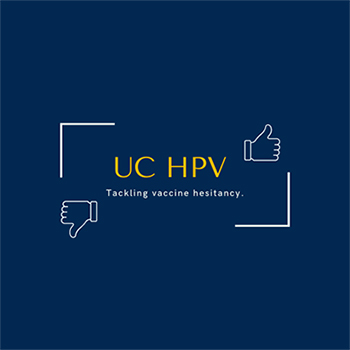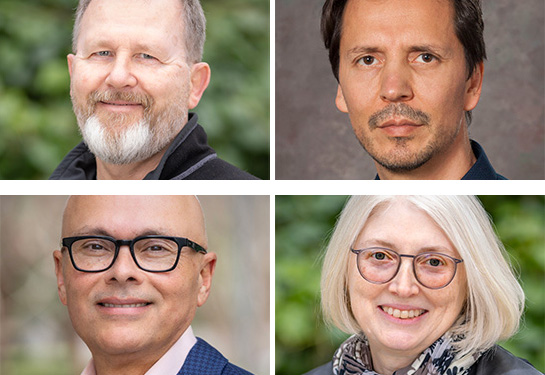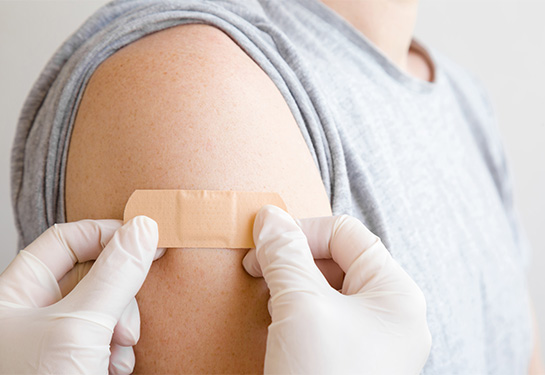Nation’s cancer centers urge action to get HPV vaccinations back on track
Child and teen HPV immunizations down 21% during COVID-19 pandemic
Along with other National Cancer Institute (NCI)-designated cancer centers across the country,

the UC Davis Comprehensive Cancer Center joined today in issuing a statement urging physicians, parents, and young adults to get the human papillomavirus (HPV) vaccination back on track.
Dramatic drops in annual well visits and immunizations during the COVID-19 pandemic have caused a significant lag in vital preventive services among U.S. children and adolescents—especially for the HPV vaccine. More information on HPV is available from the CDC and National HPV Vaccination Roundtable.
Nearly 80 million Americans – 1 out of every 4 people – are infected with HPV, a virus that causes several types of cancers. Of those millions, more than 31,000 will be diagnosed with an HPV-related cancer this year. Despite those staggering figures and the availability of a vaccine to prevent HPV infections, HPV vaccination rates remain significantly lower than other recommended adolescent vaccines in the U.S.
Even before the COVID-19 pandemic, U.S. HPV vaccination rates lagged far behind other vaccines and other countries’ HPV vaccination rates. According to 2017 data from the Centers for Disease Control (CDC), fewer than half (49%) of adolescents were up to date on the HPV vaccine. Those numbers have declined dangerously since the pandemic:
- Early in the pandemic, HPV vaccination rates among adolescents fell by 75%, resulting in a large cohort of unvaccinated children.
- Since March 2020, an estimated one million doses of HPV vaccine have been missed by adolescents with public insurance— a decline of 21% over pre-pandemic levels.
The U.S. has recommended routine HPV vaccination for females since 2006, and for males since 2011. Current recommendations are for routine vaccination at ages 11 or 12 but vaccine can be given as early as age 9. Catch-up HPV vaccination is recommended through age 26.
“We need to address this vaccination gap and quickly,” said Director of the UC Davis Comprehensive Cancer Center Primo “Lucky” Lara, Jr. “It is important for adolescents to get vaccinated for COVID-19, but we also want to make sure they are protected against HPV to help avoid certain types of cancer later in life.”
There are six types of cancers that can be caused by HPV, including nearly all cervical cancer.
NCI Cancer Centers strongly encourage parents to vaccinate their adolescents as soon as possible. The CDC recently authorized COVID-19 vaccination for 12-15-year-old children allowing for missed doses of routinely recommended vaccines, including HPV, to be administered at the same time. NCI Cancer Centers strongly urge action by health care systems and health care providers to identify and contact adolescents due for vaccinations and to use every opportunity to encourage and complete vaccination.
Local study examines HPV vaccine hesitancy
Due to the slow rate of HPV vaccinations, this year the UC Davis Comprehensive Cancer Center launched a study to try to understand where HPV vaccine hesitancy stems from and how it influences adolescent uptake of the HPV vaccine in Northern California. Recently, the cancer center is stepping up efforts to get people to participate in the study.
The Understanding and Characterizing HPV Vaccine Hesitancy or UC HPV study is currently recruiting individuals who reside or work in the following counties: Alpine, Amador, El Dorado, Nevada, Merced, Placer, Sacramento, San Joaquin, Stanislaus or Yolo to complete an online survey and or participate in focus groups and interviews. For questions, contact the study coordinators directly by emailing UCHPVStudy@gmail.com or by calling 916-566-5922.
UC Davis Comprehensive Cancer Center
UC Davis Comprehensive Cancer Center is the only National Cancer Institute-designated center serving the Central Valley and inland Northern California, a region of more than 6 million people. Its specialists provide compassionate, comprehensive care for more than 15,000 adults and children every year and access to more than 150 active clinical trials at any given time. Its innovative research program engages more than 225 scientists at UC Davis who work collaboratively to advance discovery of new tools to diagnose and treat cancer. Patients have access to leading-edge care, including immunotherapy and other targeted treatments. Its Office of Community Outreach and Engagement addresses disparities in cancer outcomes across diverse populations, and the cancer center provides comprehensive education and workforce development programs for the next generation of clinicians and scientists. For more information, visit cancer.ucdavis.edu.




